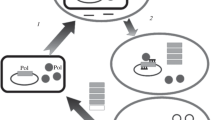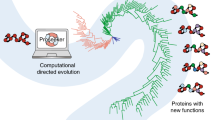Abstract.
Polynucleotide polymerases play a crucial role in transmitting genetic information from generation to generation, and they are the most important reagents in biotechnology. Although classical crystal structure analyses as well as biochemical studies have significantly contributed to our understanding of how DNA polymerases function, surprising new insights regarding the importance of certain residues and protein motifs, or of their mutability have been achieved in recent years by evolutionary approaches. Directed evolution has also facilitated the generation of polymerases with tailored substrate repertoires or with stabilities and activities beyond those of their naturally evolved counterparts. Recent new insights in polymerase structure-function relationships and new achievements in the development of tailored polymerases for current methods of nucleic acid synthesis will be summarized in this article.
Similar content being viewed by others
Author information
Authors and Affiliations
Corresponding author
Additional information
Received 22 April 2005; received after revision 20 July 2005; accepted 27 July 2005
Rights and permissions
About this article
Cite this article
Brakmann, S. Directed evolution as a tool for understanding and optimizing nucleic acid polymerase function. Cell. Mol. Life Sci. 62, 2634 (2005). https://doi.org/10.1007/s00018-005-5165-5
Published:
DOI: https://doi.org/10.1007/s00018-005-5165-5




